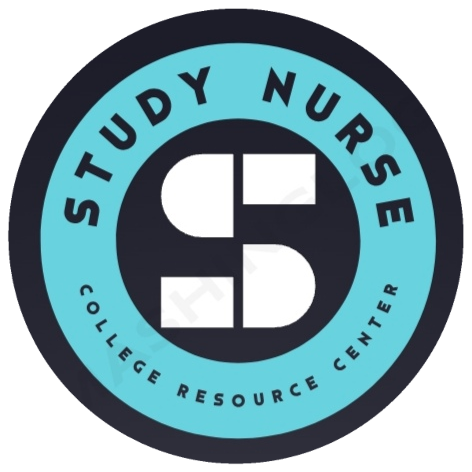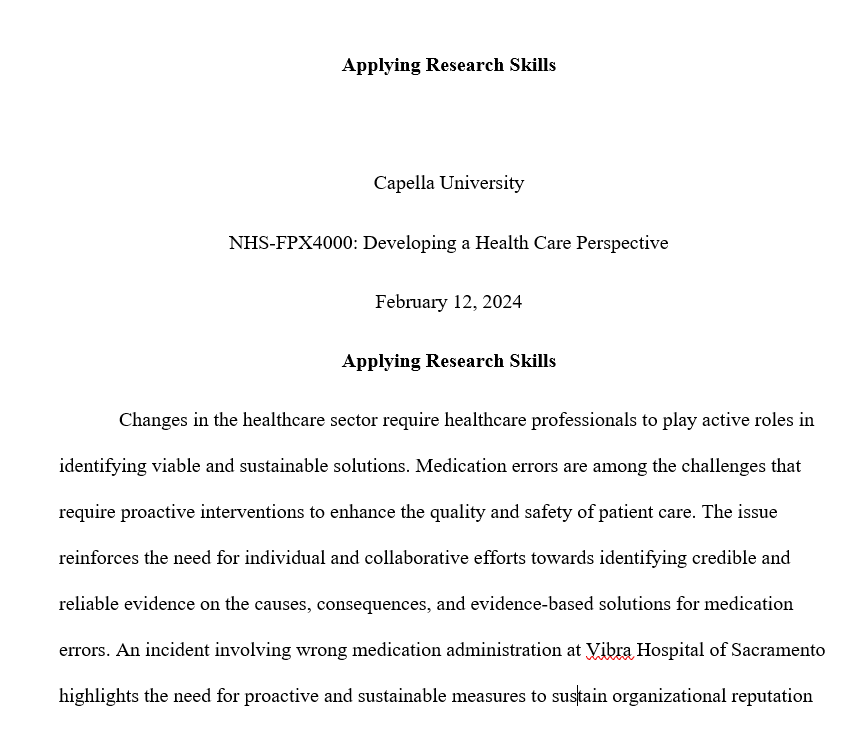Capella University
NHS-FPX4000: Developing a Health Care Perspective
February 12, 2024
Applying Research Skills
Changes in the healthcare sector require healthcare professionals to play active roles in identifying viable and sustainable solutions. Medication errors are among the challenges that require proactive interventions to enhance the quality and safety of patient care. The issue reinforces the need for individual and collaborative efforts towards identifying credible and reliable evidence on the causes, consequences, and evidence-based solutions for medication errors. An incident involving wrong medication administration at Vibra Hospital of Sacramento highlights the need for proactive and sustainable measures to sustain organizational reputation and optimize care outcomes (Rahhal, 2019). The scenario involved excessive administration of Levophed, leading to the patient’s death and a penalty of $75,000. The outcomes reveal the adverse impact of medication errors and efforts necessary to maintain desired standards.
Medication Errors
Medication errors are among the most common incidents within a complex healthcare environment. The preventable incidents expose patients, healthcare providers, and relevant affiliates to adverse outcomes including additional costs, litigations, and premature deaths. In this case, a nurse may administer the wrong dosage, use the wrong route, or misidentify a patient. Similarly, medication errors entails administering medication at the wrong time. The outcomes include adverse drug reactions associated with severe complications, prolonged hospitalization, readmissions, and mortality threats. Worrying rates and severity of medication errors reinforce the need for proactive measures, including modified policies, procedures, and technologies to restore safe and quality health services. Significant improvements demonstrate organizational commitment to making meaningful progress towards responding to the needs of every patients including those in need of high-risk and life-saving medications.
Credible and reliable evidence from peer-reviewed articles provide insights into the extent of the problem and solutions that help improve care outcomes. For instance, evidence from Nursing Reports, Evidence-Based Nursing, and Nurse Education in Practice enable clinical researchers to make informed conclusions about the different causes, impacts, and interventions for improving standards of care. Keywords such as medication errors, medication administration errors, and medication safety guide researchers to identify sources with accurate and relevant findings about errors. For credibility and reliability, it is crucial to consider articles published within the last five years. Similarly, authoritative source are vital to ensure that the authors’ credentials and organizational affiliation match the requirements for producing a research paper. Lastly, the identified sources are relevant based on appropriateness of the information and the ease of using the findings for a research paper.
Annotated Bibliography
This annotated bibliography include four peer-reviewed articles selected based on their currency, authority, and relevance. The findings provide objective evidence appropriate for educating and informing the audience about medication errors, consequences, and interventions meant to improve the quality, safety, and cost of patient care.
Alandajani, A., Khalid, B., Ng, Y.G., & Banakhar, M. (2022). Knowledge and attitudes regarding medication errors among nurses: A cross-sectional study in major Jeddah hospitals. Nursing Reports, 12(4), 1023-1238. https://www.mdpi.com/2039-4403/12/4/98
The article focuses on the influence of nurses’ knowledge and attitudes on the safety of medication administration. The authors address medication error as a multifactorial concern associated with the nursing team by-passing standards, procedures, and policies. The life-threatening impact reinforce the need for positive attitudes and behaviors as well as increased knowledge. The practice reduce the risk of non-adherence to the rights of safe medication administration. The nursing team pay attention to calls for right timing, dosage, patient, route, and medication to reduce the prevalence of medication errors. The rationale for using the article is because it focuses on nurses’ roles in maintaining a safe clinical environment. The group’s frontline roles make them primary plays in identifying and intercepting risks associated with severe complications, readmissions, prolonged hospital stays, and premature deaths.
Berdot, S., & Sabatier, B. (2018). Medication errors may be reduced by double-checking method. Evidence-Based Nursing, 21, (3), 67-67. https://hal.archives-ouvertes.fr/hal-03335317/file/Berdot%20double%20check%202018.full.pdf
The article identified medication errors as a serious challenge that requires multidisciplinary practices to enhance the quality, safety, and cost of patient care. The authors acknowledged nurses’ roles in establishing a robust clinical environment characterized by timely reporting of errors and near misses. This way, double-checking is among the viable and sustainable solutions that allow nurses to participate in practical initiatives to reduce errors. However, the authors addressed the need for the right attitudes, behaviors, and knowledge to strengthen the use of double-checks, barcoding, and staff training in identifying and intercepting errors. The rationale for using the article is because it highlights the need for enhanced training and education to improve knowledge, skills, and beliefs needed to optimize medication administration processes.
Martyn, J., Paliadelis, P., & Perry, C. (2019). The safe administration of medication: Nursing behaviors beyond the five-rights. Nurse Education in Practice, 37, 109-114. https://s1106788.stacksdiscovery.com/sites/default/files/safe%20med%20admin%20for%20112_0.pdf
Martyn et al. addressed the need for enhanced compliance with the rights of safe medication administration. The move entails encouraging the nursing team to embrace behaviors that allow them to play active roles in improving standards, policies, and structures associated with medication administration. Dealing with complexities in the modern clinical environment requires nurses to understand their frontline roles at the bedside and organizational levels. The knowledge empowers nurses to fulfill advocacy and other roles intended to enhance consistencies in upholding evidence-based and patient-centered care. The rationale for using the article is because it reminds healthcare professionals about their contributions in advocating for resources and coordinating efforts necessary to maintain safe medication administration. In this case, an evidence-based safety framework encourages collective commitment to making significant progress towards upholding the five rights of safe medication administration.
Salami, I., Subih, M., Darwish, R., Al-Jbarat, M., Saleh, Z., Maharmeh, M., Alasad, J. & Al-Amer, R. (2019). Medication administration errors. Journal of Nursing Care Quality, 34 (2), 7-12. https://pubmed.ncbi.nlm.nih.gov/29975215/
Salami et al. captured the need for organizations to accommodate nurses’ perception when addressing medication errors. The findings highlighted the need for proactive efforts toward protecting patients from the adverse short and long-term implications of medication errors. This way, incorporating nurses’ perceptions provides insights into the causes of wrong timing, dosage, patient identification, and drugs when handling patients. Similarly, the findings remind healthcare providers about administrative changes necessary to reduce medication errors during night shifts. With effective quality assurance programs, hospitals can make significant progress towards identifying and intercepting risks associated with medication errors. The rationale for using the article is because it captures the need for reinforcements designed to strengthen safety culture. The move includes establishing distraction-free zones to make nurses alert and dedicated to producing the best outcomes.
Lesson Learned
Developing the annotated bibliography was an excellent opportunity to understand challenges within the clinical environment and improvements necessary to improve the quality, safety, and cost of patient care. First, the task provided insights into the need for a clinical research driven by the need for credible and reliable sources. Secondly, the task revealed the relevance of using current articles from authoritative sources, largely peer-reviewed journals to make informed conclusions about challenges and evidence-based strategies for optimizing care outcomes. Another key lesson was the need for interdisciplinary practices to empower everyone within the clinical environment to dedicate themselves to addressing lapses and improvements that enhance the quality, safety, and cost of patient care.
References
Alandajani, A., Khalid, B., Ng, Y.G., & Banakhar, M. (2022). Knowledge and attitudes regarding medication errors among nurses: A cross-sectional study in major Jeddah hospitals. Nursing Reports, 12(4), 1023-1238. https://www.mdpi.com/2039-4403/12/4/98
Berdot, S., & Sabatier, B. (2018). Medication errors may be reduced by double-checking method. Evidence-Based Nursing, 21, (3), 67-67. https://hal.archives-ouvertes.fr/hal-03335317/file/Berdot%20double%20check%202018.full.pdf
Martyn, J., Paliadelis, P., & Perry, C. (2019). The safe administration of medication: Nursing behaviors beyond the five-rights. Nurse Education in Practice, 37, 109-114. https://s1106788.stacksdiscovery.com/sites/default/files/safe%20med%20admin%20for%20112_0.pdf
Rahhal, N. (2019). Patient dies after nurse administered 8,000 times the prescribed dose of blood pressure medication. Daily Mail. https://www.dailymail.co.uk/health/article-6573409/Patient-dies-nurse-administered-8-000-times-prescribed-dose-blood-pressure-medication.html
Salami, I., Subih, M., Darwish, R., Al-Jbarat, M., Saleh, Z., Maharmeh, M., Alasad, J. & Al-Amer, R. (2019). Medication administration errors. Journal of Nursing Care Quality, 34 (2), 7-12. https://pubmed.ncbi.nlm.nih.gov/29975215/

